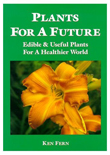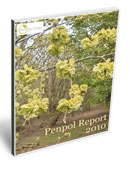
The way we currently produce our food is damaging both to ourselves and our planet. There is therefore a need to create gardens, woodlands and farms which are in harmony with nature. Natural ecosystems are good models, but many of the plants they contain are not necessarily edible. What we need is to discover and grow a wide variety of easily grown perennial and self-seeding annuals which provide delicious and healthy food, or are useful in other ways.
Plants For A Future is taking part in a research collaboration with the Permaculture Association (Britain) to help members of the public, keen enthusiasts and academics to find out more about sustainable ways of living, and the plants and other species that can contribute to that. We would like to explore the use of plants, both native to Britain and Europe and from temperate areas around the world, suitable for: the ornamental garden, the edible lawn, shade, ponds, walls, hedges, agroforestry and conservation.
Knowledge about sustainable lifestyles and useful plants should be available to everyone, so we are following a participatory action model of research. You can read more about this in the Permaculture Association's research strategy for 2014-18. What this means is that we want YOU to try these plants and techniques and experiments at home and at work, and report back to the wider community on how you got on. To find out more about what is going on and how to join in, please read Permaculture Research.
A summary of our progress from 2010-2013 in evolving a research capability and exploring the extent of and evidence for permaculture, can be seen here, in an A1 size poster and accompanying handout presented at the Radical Emission Reduction conference (London, December 2013), which was organised by the Tyndall Centre For Climate Change Research.
'A social learning organisation evolves a research capability in order to study itself'
by Ed Sears, Chris Warburton Brown, Tomas Remiarz and Rafter Sass Ferguson (2013).
 The Plants database is available on this website or we can supply the database on CD ROM or as a download from the website, for more information please visit the shop.
The Plants database is available on this website or we can supply the database on CD ROM or as a download from the website, for more information please visit the shop.
 In 1997 Ken Fern published Plants For A Future - Edible and useful plants for a healthier world. This book is available from a number of sources. Please visit the shop for more information.
In 1997 Ken Fern published Plants For A Future - Edible and useful plants for a healthier world. This book is available from a number of sources. Please visit the shop for more information.
 The Report: Plants For A Future: Survey and Research Project on the 'The Field'
The Report: Plants For A Future: Survey and Research Project on the 'The Field'
In 2010 we completed a survey and research project on the 'The Field', the experimental site of Ken and Addy Fern ( Plants For A Future founders) in Cornwall, where they carried out research and provided information on edible and otherwise useful plants suitable for growing outdoors in a temperate climate. Over time they planted 1500 species of edible plants on 'The Field' in Cornwall, which has been their base since 1989.
You can read more information here.
(1).jpg)